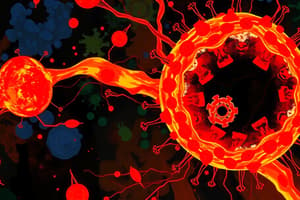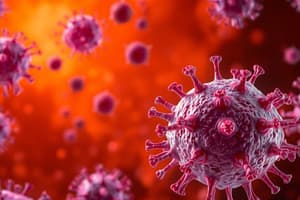Podcast
Questions and Answers
What characterizes acute inflammation?
What characterizes acute inflammation?
- Prolonged response lasting months to years
- Involvement of only T-cells
- Absence of immune cell recruitment
- Immediate response with symptoms such as redness and pain (correct)
Which immune cells are primarily involved in humoral immunity?
Which immune cells are primarily involved in humoral immunity?
- B-cells (correct)
- Cytotoxic T-cells
- Natural killer cells
- Neutrophils
What is a common trigger for chronic inflammation?
What is a common trigger for chronic inflammation?
- Persistent infections or autoimmune diseases (correct)
- Short-lived infections
- Acute inflammatory responses that resolve quickly
- Ischemic conditions
What role do cytokines play in inflammation?
What role do cytokines play in inflammation?
Which condition is characterized by reduced blood flow and potential tissue necrosis?
Which condition is characterized by reduced blood flow and potential tissue necrosis?
What type of shock is caused by loss of blood volume?
What type of shock is caused by loss of blood volume?
Which mediator is released by mast cells and causes vasodilation?
Which mediator is released by mast cells and causes vasodilation?
What is an example of a hypersensitivity reaction?
What is an example of a hypersensitivity reaction?
What primarily characterizes chronic inflammation?
What primarily characterizes chronic inflammation?
Which type of hypersensitivity reaction is mediated by IgE?
Which type of hypersensitivity reaction is mediated by IgE?
What is the primary consequence of shock?
What is the primary consequence of shock?
Which mediator is specifically responsible for attracting immune cells to infection sites?
Which mediator is specifically responsible for attracting immune cells to infection sites?
What type of shock results from heart failure?
What type of shock results from heart failure?
Which of the following is a feature of autoimmunity?
Which of the following is a feature of autoimmunity?
Which condition is characterized by the formation of a blood clot within a blood vessel?
Which condition is characterized by the formation of a blood clot within a blood vessel?
Which of the following is NOT a feature of acute inflammation?
Which of the following is NOT a feature of acute inflammation?
Study Notes
Inflammation Processes
- Definition: Inflammation is a protective response of tissues to injury or infection, involving immune cells, blood vessels, and molecular mediators.
- Types:
- Acute Inflammation: Immediate and short-term response; characterized by redness, heat, swelling, pain, and loss of function.
- Chronic Inflammation: Prolonged response; may result from unresolved acute inflammation, persistent infections, or autoimmune diseases.
- Key Mediators:
- Histamine: Released by mast cells; causes vasodilation and increased vascular permeability.
- Prostaglandins: Promote inflammation, pain, and fever.
- Cytokines: Signaling proteins (e.g., TNF-α, IL-1) that modulate the inflammatory response.
- Phases:
- Vascular Phase: Initial vasodilation and increased blood flow.
- Cellular Phase: Recruitment of leukocytes to the site of injury/infection.
Immune Response Alterations
- Innate Immunity: First line of defense; includes physical barriers (skin, mucous membranes), phagocytic cells (neutrophils, macrophages), and natural killer cells.
- Adaptive Immunity: Specific response involving lymphocytes (B-cells and T-cells).
- B-cells: Produce antibodies for humoral immunity.
- T-cells:
- Helper T-cells (CD4+): Aid in activating B-cells and cytotoxic T-cells.
- Cytotoxic T-cells (CD8+): Directly kill infected or cancerous cells.
- Alterations:
- Hypersensitivity Reactions: Exaggerated immune responses (e.g., allergies, autoimmune disorders).
- Immune Deficiency: Reduced ability to mount an immune response (e.g., HIV/AIDS).
- Autoimmunity: Immune system mistakenly attacks self-tissues (e.g., lupus, rheumatoid arthritis).
Hemodynamic Disorders
- Definition: Conditions affecting blood flow, pressure, and volume, leading to tissue perfusion issues.
- Types:
- Hyperemia: Increased blood flow to tissues; can be active (physiological) or passive (congestive).
- Ischemia: Reduced blood flow leading to oxygen deficiency; may cause necrosis if prolonged.
- Hemorrhage: Escape of blood from the circulatory system; can result from trauma, rupture of vessels, or coagulation disorders.
- Consequences:
- Shock: A state of inadequate blood flow that results in cellular injury and tissue death; types include hypovolemic, cardiogenic, obstructive, and distributive shock.
- Edema: Accumulation of excess fluid in tissues, caused by increased hydrostatic pressure, reduced oncotic pressure, or lymphatic obstruction.
Inflammation Processes
- Inflammation is the body's response to injury or infection, involving immune cells, blood vessels, and molecular mediators.
- Acute inflammation is a short-term response with symptoms of redness, heat, swelling, pain, and loss of function.
- Chronic inflammation is prolonged and may result from persistent infection or unresolved acute inflammation.
- Histamine, prostaglandins, and cytokines are key mediators of inflammation.
- Histamine dilates blood vessels and increases permeability.
- Prostaglandins promote inflammation, pain, and fever.
- Cytokines like TNF-α and IL-1 modulate the inflammatory response.
- The vascular phase of inflammation involves vasodilation and increased blood flow.
- The cellular phase involves the recruitment of leukocytes to the site of injury.
Immune Response Alterations
- Innate immunity, the first line of defense, includes physical barriers (skin, mucous membranes), phagocytic cells, and natural killer cells.
- Adaptive immunity is a specific response involving B-cells and T-cells.
- B-cells produce antibodies for humoral immunity.
- Helper T-cells (CD4+) activate B-cells and cytotoxic T-cells.
- Cytotoxic T-cells (CD8+) directly kill infected or cancerous cells.
- Hypersensitivity reactions are exaggerated immune responses leading to allergies or autoimmune disorders.
- Immune deficiency is a reduced ability to mount an immune response.
- Autoimmunity occurs when the immune system mistakenly attacks self-tissues.
Hemodynamic Disorders
- Hemodynamic disorders affect blood flow, pressure, and volume, leading to tissue perfusion issues.
- Hyperemia is an increase in blood flow that can be physiological or due to congestion.
- Ischemia is a reduction in blood flow leading to oxygen deficiency, which can cause necrosis if prolonged.
- Hemorrhage is the escape of blood from the circulatory system, which can result from trauma, vessel rupture, or coagulation disorders.
- Shock is a state of inadequate blood flow resulting in cellular injury and tissue death.
- Edema is the accumulation of fluid in tissues, caused by increased hydrostatic pressure, reduced oncotic pressure, or lymphatic obstruction.
Inflammation Processes
- Inflammation is a protective response to injury or infection
- Acute inflammation is short-term, involving vasodilation, increased permeability, white blood cell recruitment, and the release of inflammatory mediators like histamines and cytokines
- Chronic inflammation is a prolonged response characterized by continuous inflammation, tissue destruction, and repair, with infiltration of mononuclear cells and the formation of granulomas
- Key inflammatory mediators include cytokines, chemokines, and prostaglandins/leukotrienes
Immune Response Alterations
- Hypersensitivity reactions are exaggerated immune responses, classified into four types:
- Type I: Allergic reactions (IgE-mediated)
- Type II: Antibody-mediated (cytotoxic) reactions
- Type III: Immune complex-mediated reactions
- Type IV: Delayed-type hypersensitivities (T-cell mediated)
- Autoimmunity occurs when the immune system attacks self-antigens, leading to tissue damage (e.g., rheumatoid arthritis, lupus)
- Immunodeficiency is a weakened immune response, either due to genetic defects (primary) or acquired conditions (secondary, e.g., HIV/AIDS)
- Key features of the immune response include antigen recognition by immune cells, clonal expansion of lymphocytes, and memory cell formation for long-term immunity
Hemodynamic Disorders
- Hemodynamic disorders are pathological alterations in blood flow and blood volume, affecting tissue perfusion
- Shock is inadequate tissue perfusion leading to cellular hypoxia, classified into:
- Hypovolemic shock: Due to loss of blood volume
- Cardiogenic shock: Due to heart failure
- Distributive shock: Due to vasodilation (e.g., septic shock)
- Obstructive shock: Due to physical obstruction of great vessels
- Thrombosis is the formation of a blood clot within a blood vessel, leading to obstruction of blood flow (e.g., deep vein thrombosis)
- Embolism is the obstruction of a blood vessel by a foreign material (e.g., fat, air, tumor cells)
- Complications of hemodynamic disorders include ischemia (lack of blood supply causing tissue damage), infarction (tissue death due to insufficient blood flow), and varicose veins (chronic venous insufficiency leading to distended vessels)
Studying That Suits You
Use AI to generate personalized quizzes and flashcards to suit your learning preferences.
Description
This quiz covers essential concepts related to inflammation, including its definitions, types, phases, and key mediators involved in both acute and chronic inflammation. It also discusses the basics of the immune response, particularly innate immunity. Test your understanding of these vital biological processes!





